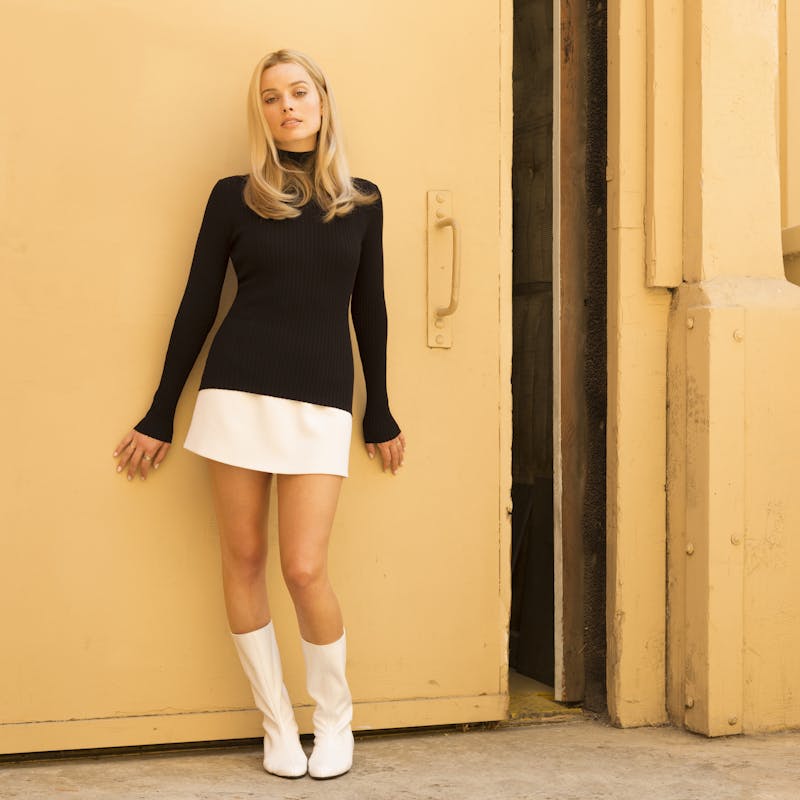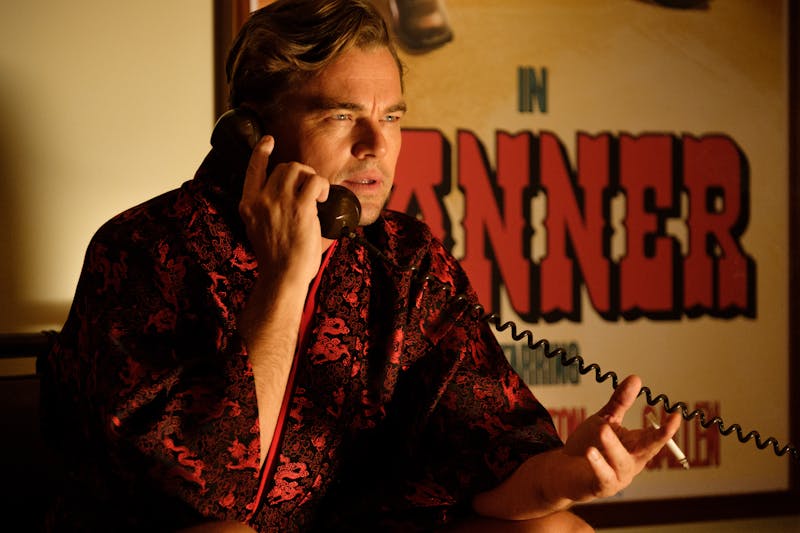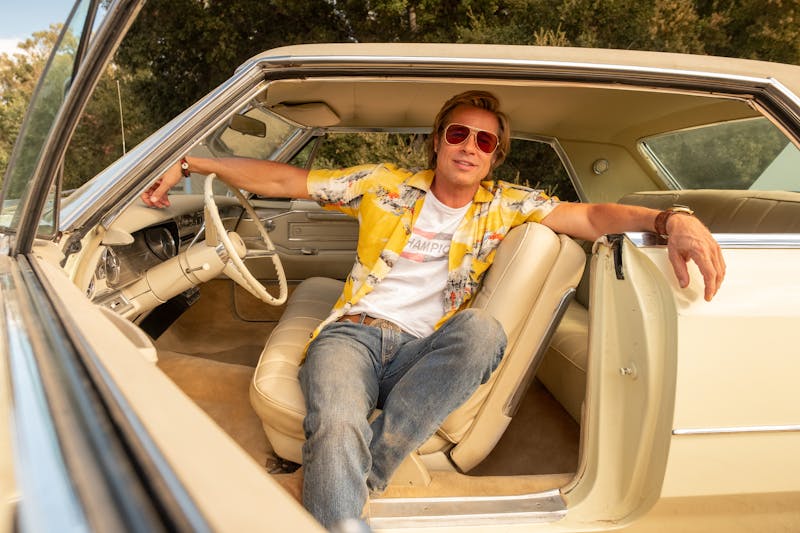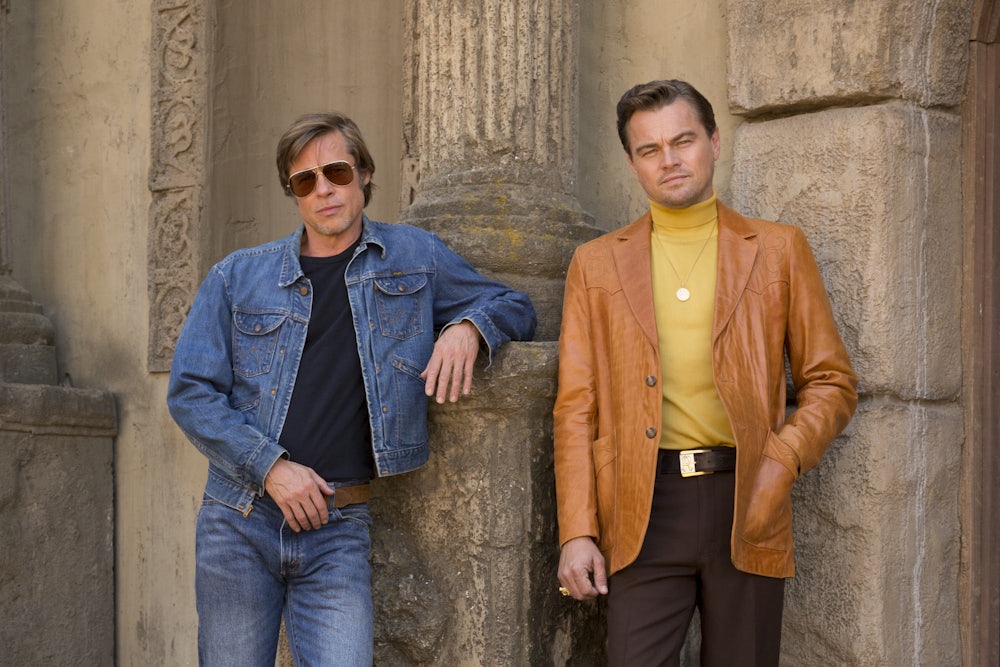As the final act of Once Upon a Time ... In Hollywood begins, the Rolling Stones’s “Out of Time” starts to play. The chorus (“baaaby, baaaby, baaaby you’re out of time”) is like a mean Ronettes song. “You’re obsolete, my baby,” Mick Jagger sings. “My poor old-fashioned baby.”
The song is a lament for days gone by, but also a warning to the old that the times are changing: Woe betide those who do not reform. It’s the perfect soundtrack to Quentin Tarantino’s new movie, which is about the clash of cultural generations in Hollywood in the summer of 1969. It’s also the first film the auteur has made without the guidance of a man named Harvey Weinstein, whose company Miramax produced each one of his movies and who assaulted both his ex-girlfriend Mira Sorvino and his most famous muse Uma Thurman.
That story came to light at the same time Thurman disclosed that Tarantino had pressured her to do a dangerous car stunt that injured her badly. With respect to Weinstein, Tarantino has admitted that he “knew enough to do more than [he] did,” and that the information he received at the time “wasn’t secondhand.”
Tarantino’s professional association with an alleged serial sexual abuser has certain thematic resonances with his actual films. Despite his unparalleled ability to draw box office crowds to see something other than superhero movies, critics have accused Tarantino of only having three signature themes to unite his celebrated oeuvre: loud soundtracks filled with rare gems, a love of making actors say the n-word, and gratuitous depictions of violence against women.
This new movie, then, was always going to have to address those narratives if Tarantino wanted to have a future. It’s never easy to question his artistry, because it speaks for itself in movies like Jackie Brown, which rise above his poorer works to enter the pantheon of great twentieth-century art. Then again, Roman Polanski made very good movies, too, and he’s been beyond the pale for a while. The proof must be, as they say, in the pudding.

Leonardo DiCaprio plays Rick Dalton, an aging star of the John Wayne school who has become insecure and weepy, unable to handle losing his status as Hollywood’s hard man. Brad Pitt is Cliff Booth, Rick’s stunt double and part-time chauffeur: “A buddy who is a more than a brother and a little less than a wife,” as the movie’s voice-over explains. We follow the pair as they run around Los Angeles, looking for work and yelling at hippies out of the car window. Together, Rick and Cliff form a dyad of old-school silver-screen masculinity, almost cartoonishly macho though admittedly very sexy in their fast cars and tight jeans.
The world around them is both fictional and not. Tarantino’s meticulous filmmaking places us firmly in the real world, with fabrics and fixtures and haircuts so vividly done that the movie is swamped in atmosphere. Here and there, Tarantino-universe references pop up: Rick does an ad for Red Apple Cigarettes, for example, which also appear in Pulp Fiction, The Hateful Eight, and Kill Bill Vol I. But then reality starts to fray, and what began as a buddy comedy turns into a full-on revisionist history of the summer of 1969.
In this semi-fictional universe, it turns out that Rick lives right next door to Sharon Tate (Margot Robbie) and Polanski (Rafal Zawierucha). What luck! His career ailing, Rick considers how he might parlay a chance encounter into a break. Meanwhile, Cliff has a friend who just happens to have a gang of sexy barefoot hippies running around his compound, one of whom seems bent on luring him there.
Without giving too much away, it’s fair to say that Once Upon a Time builds toward a “what if” denouement that pits Hollywood’s good old boys against the young nihilists of 1969 in a literal battle for survival, modeling the generational conflict between them—violent women versus macho men, old-time actors versus hippie dropouts. It all turns to farce, and we’re treated to a showdown in the classic Hollywood tradition.
But the movie is also as much about the differences between Rick and Cliff. In a surreal development, the kind of masculine hero Rick inhabited on screen (soldier, cop, cowboy, bounty killer) shows up in the real-life behavior of his stuntman. It’s as if the fiction is leaking out of Rick’s career and into Cliff’s life.

Rick is soft and masochistic, prone to fits of tears. The very existence of Cliff proves that he never did his own stunts, and Rick is anxious to the point of vanity over his acting and others’ perceptions of it. By contrast, Cliff is a sadist. Almost indistinguishable from a mid-’70s Robert Redford, Pitt as Cliff strides through Los Angeles in skinny jeans, a pretty hairdo, and two balled fists. He likes to drive his car fast and pick up girls. His career as a stunt double basically ended, we learn via flashback, when he threw Bruce Lee (depicted as a petty fool by Mike Moh, who does lots of stereotypical martial arts screeching) into the side of the costume designer’s car. Oh, and he killed his wife on a boat and got away with it, in a clear allusion to Robert Wagner and Natalie Wood’s fatal excursion at sea.
Outside Rick’s house is a big painted advertisement for one of his movies, which we see through the windshield every time Cliff parks the car. The painting captures DiCaprio in his silliest Jack Nicholson impression, teeth bared and eyebrows contorted like a parody of a good actor. It starts to look more and more like Cliff as the movie goes on.
So the “real man” is a kind of nightmare double of the actor. Cliff’s keys jangle like spurs as he squares up against a fistfight opponent; Rick merely plays at being a cowboy, his costume providing plenty of jangle but his masculinity as artificial as his glued-on mustache.
It’s not hard to see these two men as representing two sides of Quentin Tarantino himself, who has both played the n-word-spewing tough guy and is the geeky film nerd enacting violent male fantasies. Their actions constitute a reconsideration of his own body of work. Once Upon a Time is full of nods to classic films (look out for an actual Maltese Falcon), but this time Tarantino includes himself in that canon. Hitler is killed in this movie, too, though not by Rick: It’s a character he played in a hit movie of his youth that bears a resemblance to Tarantino’s Inglourious Basterds. “Anyone for fried sauerkraut?” we see him yell in a movie-flashback, before he blows those Nazi bastards away with a flamethrower.
Just as the audience begins to tire of Rick and Cliff’s adventures, the women arrive. Robbie is the spitting image of Sharon Tate, having learned to hold her face in just the right accommodating smile. But she rarely does anything except grin. She trots around town in cute outfits, always laughing, going to see her own movies on a lark. Similarly reduced is the character of Pussycat, a young hippie who hitchhikes a ride with Cliff and speaks only in sexual innuendo.

The two women are cardboard cutouts, but specifically cutouts in the Tarantino style—another self-referential motif. Consider the way the women are shot, from the legs up: Tate mostly wears miniskirts, and the camera dwells lovingly on her knees, while Pussycat’s long legs dance in denim cutoffs. Both women are filmed with their bare feet propped up close to the camera—Pussycat’s on the dash, Tate’s resting on a theater seat. It’s a clear reference to Tarantino’s own foot fetish, which you can experience queasily in movies like Jackie Brown, which is very interested in Bridget Fonda’s nubile toes. The kindness with which Tarantino treats them—despite or because of their reduction to fetish objects—feels like some kind of postmodern apology for past mistakes.
It’s a generous reading, but Tarantino seems in this movie to be authentically engaging with his own hokiest tendencies, sending himself up. Before you forgive him, however, note that this movie contains perhaps some of the nastiest and bloodiest violence against women of his entire oeuvre. But there is self-critique here, too. All the worst violence comes at the hands of Cliff, who is so macho and so tough that he barely seems like a real human being. He is literally an allegorical embodiment of male movie violence.
Cliff is an avatar of cinema’s beautiful ills, and therefore symbolizes all Tarantino feels most ambivalent about: the movie violence he loves but that has tainted his career, the machismo he admires but has none of himself. Does all this sophisticated intertextual meta-commentary make it easier to watch Brad Pitt beat a woman’s face to a pulp against a mantelpiece? Not really.
Movie reviews are not court cases, but let’s presume Tarantino’s innocence for a moment. Let’s say that he intended every moment in this movie as a parody of his own work and his own style of filmmaking. Let’s say he portrayed a woman burning to death in order to make a point about the violence in his own movies. Let’s say he made Polanski look like an idiot and cast Hollywood’s premier leading men as macho morons because Quentin Tarantino is actually a feminist filmmaker who wants to interrogate screen masculinity. Let’s say all that. Is he off the hook for the rest?
The answer must be up to the viewer and her conscience. People experience the intersection of entertainment and politics in different ways, and a super-postmodern movie like this will hit every mind differently, depending, for example, on how much you care about the inside-jokes in Tarantino’s imaginary universe. He has created a movie that dwells longingly on Hollywood’s past, while trying to make the case for its relevance in Hollywood’s future. Don’t mistake me: This movie is good. It all depends on how hard you’re willing to work to justify its pleasures.
